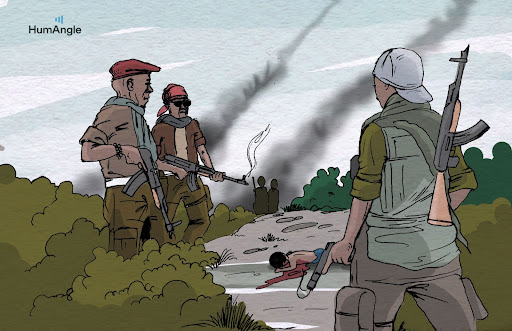CODECO Rebels Kill Civilians In Ituri, DR Congo Attack
The CODECO rebels killed the victims with machetes, arrows, and firearms. Among the victims were seven children, six women, and five men.

“Eighteen corpses of victims are right now kept in a local sawmill which is serving as a mortuary,” revealed Innocent Matukadala, chief of the Banyali Kilo chiefdom in Djugu territory, adding that “the people are angry. Tension is at its peak and we are trying to calm the situation.”
According to Jean-Robert Basiloko, President of the civil society in the Banyali Kilo chiefdom, the CODECO rebels killed the victims with machetes, arrows, and firearms. Among the victims were seven children, six women, and five men.
Sources in the area say the Blue Helmets of the United Nations Organisation Stabilisation Mission in the Democratic Republic of Congo (MONUSCO) and humanitarian organisations had quit the zone several weeks ago.
The CODECO rebel group is a mystical-military organisation which claims to defend the Lendu community and according to the United Nations and Congolese authorities, this group is behind most of the violence in Ituri province.
Early this month, 62 persons, mostly of the rival Hema ethnic group, were killed by CODECO and in the neighbouring North Kivu province, seven civilians in Ndiva village were killed in the night of Monday, Feb. 14, during an attack by rebels of the Allied Democratic Forces (ADF), according to Odette Zawadi, President of the Watalinga civil society in the territory of Beni.
During the fight for the control of Ndiva, four ADF rebels were killed, the spokesperson of the DR Congo army in Beni region, Captain Anthony Mwalushayi revealed.
Ndiva village is situated nine kilometres from Mukakati, where the staff headquarters of the Ugandan army contingent in DR Congo is installed since Nov. 30, 2021 when the Ugandan People’s Defense Forces (UPDF) and the DR Congo forces, FARDC, have been carrying out military operations against the ADF.
The ADF is presented by the Islamic State as its Central African province and is accused of numerous massacres in eastern DR Congo where it has been installed since 1990 as well as recent jihadist attacks on Ugandan soil.
Support Our Journalism
There are millions of ordinary people affected by conflict in Africa whose stories are missing in the mainstream media. HumAngle is determined to tell those challenging and under-reported stories, hoping that the people impacted by these conflicts will find the safety and security they deserve.
To ensure that we continue to provide public service coverage, we have a small favour to ask you. We want you to be part of our journalistic endeavour by contributing a token to us.
Your donation will further promote a robust, free, and independent media.
Donate HereStay Closer To The Stories That Matter




